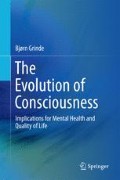Abstract
The first chapter explains why consciousness—in a way—is all you got. Without the capacity to experience life, there is really nothing in it for you. This is why you ought to understand this feature of the human brain. In other words, you are just an “app” that the unconscious part of the brain turns on in the morning and off at night. Moreover, the unconscious brain is partly responsible for directing your “film of life”, based on instructions laid down in the genes. The chapter introduces an evolutionary perspective that helps us understand the human mind, as well as key concepts related to the study of consciousness.
Access this chapter
Tax calculation will be finalised at checkout
Purchases are for personal use only
Notes
- 1.
From Locke’s most famous work: An Essay Concerning Human Understanding (1689).
- 2.
I recommend his TED talk: https://www.ted.com/talks/donald_hoffman_do_we_see_reality_as_it_is?language=en.
- 3.
As to the Chinese, see Hvistendahl M. Study exposes Chinese censors’ deepest fears. Science 345 (2014) 859–860; as to the brain, continue reading.
- 4.
Markram H, Rinaldi T, Markram K. The intense world syndrome—an alternative hypothesis for autism. Frontiers in Neuroscience 1 (2007) 77–96.
- 5.
Soon CS, Brass M, Heinze HJ, Haynes JD. Unconscious determinants of free decisions in the human brain. Nature Neuroscience 11 (2008) 543–545.
- 6.
Xie L et al. Sleep drives metabolite clearance from the adult brain. Science 342 (2013) 373–377.
- 7.
Tamietto M, de Gelder B. Neural bases of the non-conscious perception of emotional signals. Nature Reviews Neuroscience 11 (2010) 697–709.
- 8.
Lutz A et al. Long-term meditators self-induce high-amplitude gamma synchrony during mental practice. Proceedings of the National Academy of Science USA 101 (2004) 16369–16373.
- 9.
In his book (2007, Atlantic) Ricard points to the importance of meditating on compassion and thereby improve ones capacity for empathy.
- 10.
Sacks O. Hallucinations. (2012, Vintage Books).
- 11.
Descartes R. The works of Rene Descartes. (2010, Kindle edition).
- 12.
See Wikipedia: http://en.wikipedia.org/wiki/Phlogiston_theory.
- 13.
Oizumi M, Albantakis L, Tononi G. From the phenomenology to the mechanisms of consciousness: integrated information theory 3.0. PLOS Computational Biology 10 (2014) e1003588.
- 14.
Hameroff SR, Penrose R. Conscious events as orchestrated space-time selections. Journal of Consciousness Studies 18 (1996) 36–53.
- 15.
Sutherland S. Feature selection. Nature 392 (1998) 350.
Author information
Authors and Affiliations
Corresponding author
Rights and permissions
Copyright information
© 2016 Springer International Publishing Switzerland
About this chapter
Cite this chapter
Grinde, B. (2016). A Conscious Life. In: The Evolution of Consciousness. Springer, Cham. https://doi.org/10.1007/978-3-319-43685-2_1
Download citation
DOI: https://doi.org/10.1007/978-3-319-43685-2_1
Published:
Publisher Name: Springer, Cham
Print ISBN: 978-3-319-43683-8
Online ISBN: 978-3-319-43685-2
eBook Packages: Behavioral Science and PsychologyBehavioral Science and Psychology (R0)

